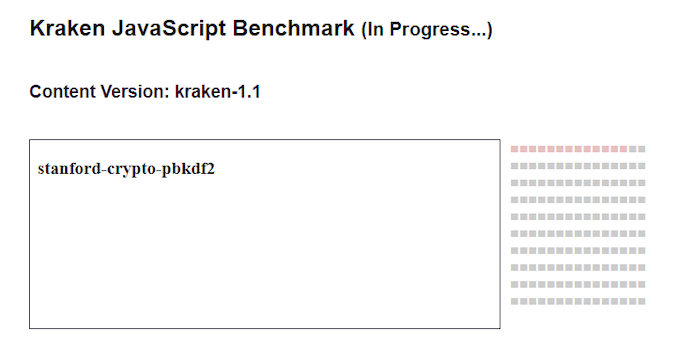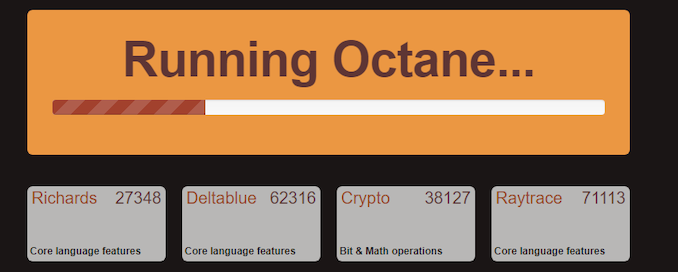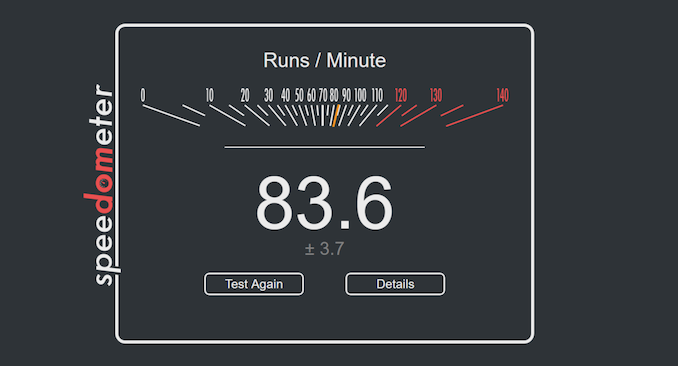Intel 11th Generation Core Tiger Lake-H Performance Review: Fast and Power Hungry
by Brett Howse & Andrei Frumusanu on May 17, 2021 9:00 AM EST- Posted in
- CPUs
- Intel
- 10nm
- Willow Cove
- SuperFin
- 11th Gen
- Tiger Lake-H
CPU Tests: Legacy and Web
In order to gather data to compare with older benchmarks, we are still keeping a number of tests under our ‘legacy’ section. This includes all the former major versions of CineBench (R15, R11.5, R10) as well as x264 HD 3.0 and the first very naïve version of 3DPM v2.1. We won’t be transferring the data over from the old testing into Bench, otherwise it would be populated with 200 CPUs with only one data point, so it will fill up as we test more CPUs like the others.
The other section here is our web tests.
Web Tests: Kraken, Octane, and Speedometer
Benchmarking using web tools is always a bit difficult. Browsers change almost daily, and the way the web is used changes even quicker. While there is some scope for advanced computational based benchmarks, most users care about responsiveness, which requires a strong back-end to work quickly to provide on the front-end. The benchmarks we chose for our web tests are essentially industry standards – at least once upon a time.
It should be noted that for each test, the browser is closed and re-opened a new with a fresh cache. We use a fixed Chromium version for our tests with the update capabilities removed to ensure consistency.
Mozilla Kraken 1.1
Kraken is a 2010 benchmark from Mozilla and does a series of JavaScript tests. These tests are a little more involved than previous tests, looking at artificial intelligence, audio manipulation, image manipulation, json parsing, and cryptographic functions. The benchmark starts with an initial download of data for the audio and imaging, and then runs through 10 times giving a timed result.
We loop through the 10-run test four times (so that’s a total of 40 runs), and average the four end-results. The result is given as time to complete the test, and we’re reaching a slow asymptotic limit with regards the highest IPC processors.

Google Octane 2.0
Our second test is also JavaScript based, but uses a lot more variation of newer JS techniques, such as object-oriented programming, kernel simulation, object creation/destruction, garbage collection, array manipulations, compiler latency and code execution.
Octane was developed after the discontinuation of other tests, with the goal of being more web-like than previous tests. It has been a popular benchmark, making it an obvious target for optimizations in the JavaScript engines. Ultimately it was retired in early 2017 due to this, although it is still widely used as a tool to determine general CPU performance in a number of web tasks.

Speedometer 2: JavaScript Frameworks
Our newest web test is Speedometer 2, which is a test over a series of JavaScript frameworks to do three simple things: built a list, enable each item in the list, and remove the list. All the frameworks implement the same visual cues, but obviously apply them from different coding angles.
Our test goes through the list of frameworks, and produces a final score indicative of ‘rpm’, one of the benchmarks internal metrics.
We repeat over the benchmark for a dozen loops, taking the average of the last five.

Legacy Tests

















229 Comments
View All Comments
heickelrrx - Monday, May 17, 2021 - link
back when rocket lake design were finalized the 10nm hasn't matured like today10nm has delayed a lot, they simply tired waiting
sandeep_r_89 - Tuesday, May 18, 2021 - link
Ooh yes, I'd like an NUC with Tigerlake-Hmode_13h - Tuesday, May 18, 2021 - link
It should be NUC11 Extreme, if they do it. The Extreme-series are NUCs in name only.Matthias B V - Monday, May 17, 2021 - link
Indeed it is a big and crucial step as it is the first new arch and node on H45+ all predecessors where Skylake and 14nm iterations.However a make or break will be AlderLake as bigLITTLE either is a game changer or an issue. Golden cove will be good but it really depends on the sheduling and Gracemont.
Especially on possible benefits on mobile run time and consumption!
SarahKerrigan - Monday, May 17, 2021 - link
Looks moderately competitive if you ignore power. Better than nothing, I guess.RanFodar - Monday, May 17, 2021 - link
It's very competitive (except efficiency), not moderate. They're now trading blows here.Krysto - Monday, May 17, 2021 - link
So no reason to get one when you can get an AMD alternative that has similar performance for half the power draw.RanFodar - Monday, May 17, 2021 - link
It has platform advantages (i.e. PCIE 4, Thunderbolt) and if anticipated, great gaming performance. As a consumer, it is much better to have a choice with competitive processors. And there will be reasons to buy a Tiger Lake system when it comes up for review.mode_13h - Monday, May 17, 2021 - link
Does PCIe 4 really provide any measurable benefits, in a laptop ???xpclient - Monday, May 17, 2021 - link
Yes I think so. Have you seen PCIe Gen 3 SSDs reach these speeds? https://pbs.twimg.com/media/E1QXL2qVgAAZfnL.png